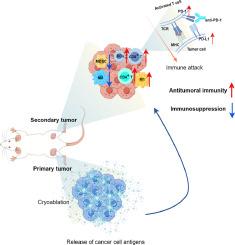在宫颈癌小鼠模型中,冷冻消融与抗PD-1免疫疗法协同诱导有效的脱落效应。
IF 5
2区 医学
Q2 Medicine
引用次数: 0
摘要
背景:免疫检查点抑制剂(ICIs),尤其是抗PD-1/PD-L1抗体,已成为治疗宫颈癌的有前途的选择。然而,抗PD-1抗体单一疗法的疗效有限。低温消融可引起抗肿瘤免疫反应,从而成为增强 ICIs 反应的潜在方法。我们的研究旨在探讨冷冻消融的全身免疫学效应以及冷冻消融和抗PD-1抗体在宫颈癌中的潜在协同抗肿瘤效应:方法: 我们建立了U14小鼠双侧皮下宫颈癌模型,对原发肿瘤进行冷冻消融治疗。方法:我们建立了 U14 小鼠双侧皮下宫颈癌模型,对原发肿瘤进行冷冻消融治疗,并使用流式细胞术、免疫组化和 RNA-seq 分析继发肿瘤中的免疫细胞浸润和免疫相关通路:我们的研究发现,冷冻消融重塑了免疫格局,导致远处肿瘤中 CD8+ T 细胞浸润增强。低温消融为提高抗PD-1免疫疗法的疗效创造了有利环境。低温消融联合抗PD-1抗体可抑制远处肿瘤的生长,提高小鼠的存活率。从机理上讲,这种联合疗法可以增加CD8+ T细胞、CD4+ T细胞、树突状细胞和M1样肿瘤相关巨噬细胞的浸润,增强多方面的抗肿瘤免疫反应,减少远处肿瘤中的免疫抑制细胞,如M2样肿瘤相关巨噬细胞和髓源性抑制细胞:在宫颈癌小鼠模型中,冷冻消融与抗PD-1抗体的联合治疗可诱导有效的脱落效应,可能是晚期/复发性宫颈癌患者的一种新型治疗方法。本文章由计算机程序翻译,如有差异,请以英文原文为准。

Cryoablation synergizes with anti-PD-1 immunotherapy induces an effective abscopal effect in murine model of cervical cancer
Background
Immune checkpoint inhibitors (ICIs), especially anti-PD-1/PD-L1 antibodies, have emerged as promising therapeutic options for cervical cancer. However, the efficacy of anti-PD-1 antibody monotherapy is limited. Cryoablation could elicit an anti-tumor immune response, thereby presenting itself as a potential approach to augment the response of ICIs. The aim of our study was to investigate the systemic immunological effects of cryoablation and the potential synergistic anti-tumor effects of cryoablation and anti-PD-1 antibody in cervical cancer.
Methods
We established U14 murine bilateral subcutaneous cervical cancer model, wherein the primary tumors were treated with cryoablation. Flow cytometry, immunohistochemistry and RNA-seq were used to analyze the immune cell infiltration and immune-associated pathways in the secondary tumor.
Results
Our study revealed that cryoablation reprogrammed the immune landscape, leading to an enhanced infiltration of CD8+ T cell in distant tumors. Cryoablation created a conducive environment for increasing the efficacy of anti-PD-1 immunotherapy. Cryoablation in combination with anti-PD-1 antibody inhibited distant tumors growth and improved mouse survival. Mechanistically, this combination therapy could augment the infiltration of CD8+ T cells, CD4+ T cells, dendritic cells and M1-like tumor-associated macrophages, enhance multiple aspects of antitumor immune response, and reduce immunosuppressive cells such as M2-like tumor-associated macrophages and myeloid-derived suppressor cells in distant tumors.
Conclusions
Combination therapy with cryoablation and anti-PD-1 antibody induces an effective abscopal effect in murine model of cervical cancer and may be a novel therapeutic approach for patients with advanced/recurrent cervical cancer.
求助全文
通过发布文献求助,成功后即可免费获取论文全文。
去求助
来源期刊

Translational Oncology
ONCOLOGY-
CiteScore
8.40
自引率
2.00%
发文量
314
审稿时长
54 days
期刊介绍:
Translational Oncology publishes the results of novel research investigations which bridge the laboratory and clinical settings including risk assessment, cellular and molecular characterization, prevention, detection, diagnosis and treatment of human cancers with the overall goal of improving the clinical care of oncology patients. Translational Oncology will publish laboratory studies of novel therapeutic interventions as well as clinical trials which evaluate new treatment paradigms for cancer. Peer reviewed manuscript types include Original Reports, Reviews and Editorials.
 求助内容:
求助内容: 应助结果提醒方式:
应助结果提醒方式:


